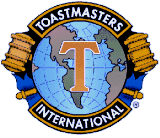

001005.gif)
001004.gif)
001003.gif)
001002.gif)

|
|
District Officers |
| - District Governor | |
|
|
- LGET |
| - LGM | |
| - Special Assistant | |
| - DPRO | |
| - District Secretary | |
| - District Treasurer | |
|
|
District Information |
|
|
Calendar |
|
|
News |
|
|
Events |
|
|
Useful Link |
|
|
Members Services |
|
|
Feedback |
Hong Kong, Macau, Singapore and Thailand
| 26-02-05 | Acing Your Manual | LGET |
| 22-01-05 | HELPING EACH OTHER SUCCEED. SALUTING SUCCESS. | LGET |
|
LGET & Task Force |
||
|
P1: Ice Breaker - A Supplementary Guide |
Kan Kin Fung DTM |
|
|
Meetings That Explode With Excitement |
Colette Gardner DTM |
|
|
EDUCATION & TRAINING GOALS FOR 2004-05 |
Dr. Khong DTM |
|
| 07-08-04 | Quality Speech Contests (PPT) | Ho Fong Ming DTM |

|
"Tips
on Manual Speeches" Project 1: The Ice Breaker Ė A Supplementary Guide |
|
(Rev 01. Sep 2004. Based
on the 2003 edition of the Communication & Leadership Manual,
Toastmasters International.) |
|
Project 1: The Ice Breaker Ė A Supplementary Guide |
12th September 2004 |
|
What are the keys to tackling this project? Keys: (a) Attitude (b) Selection of points (c) Staying within time limits (d) Opening, body, conclusion, title. |
|||||||||||
|
(a) |
Attitude.
|
||||||||||
|
|
|
||||||||||
|
(b) |
Selection of points.
|
||||||||||
|
|
|
||||||||||
|
(c) |
Staying
within the time limits.
|
||||||||||
|
|
|
||||||||||
|
(d) |
Opening, body, conclusion, title. |
||||||||||
|
Can I use notes during the presentation? Absolutely. This is not a memory test. By all means use notes.
That said, try not to use the notes as a security blanket. Memorize the opening and the conclusion. Practise giving the body of the speech so well, that you only need to take a glance at the key words in the notes, to know what to say next.
Use a note card (about 3 inches by 5 inches). First write the full script of the whole speech on another piece of paper. Then select the key words in each main point. Write only the key words on the note card. Then practise presenting your speech using your note card, not your full script. At first, youíll need to peep at your full script frequently. As you practise more, you will become more and more familiar with the material. Eventually, you only need to take a quick glance at the key words in your note card (and not the full script), to know what to say next. However, donít memorize the body of the speech word by word. Otherwise, during the presentation, you will tend to focus on recalling the script, not on presenting the speech. When you give your speech at your club, you donít have to faithfully follow 100% of your script, as long as you cover all your main points. Donít be pre-occupied with recalling every single little detail in your script. No one else has read your full script. Even if you miss a few minor details, no one will notice. Focus on presenting the main points. You have your note card to help you.
What if I ďblank outĒ during the presentation? During the presentation, if you need one, hold the note card in your hand. Have the full script of your speech, in large font, in your pocket. In the unlikely event that you ďblank outĒ (cannot recall what to say next, even with the help of the note card), you can pull out the full script, and read from the script, to restart your speech.
Will I be failed by the evaluator? No. The evaluator will highlight your strengths, and offer you a few suggestions for improvement, in an encouraging and supportive manner. He or she will not pass or fail you, or give you a grade.
Also, whatever the evaluator says, is just his or her personal opinion. The evaluator does not represent the audience, or the Club, or Toastmaster International, or any ďSpeech AuthoritiesĒ. The evaluator does not hold the ultimate authority to the eternal truth. Donít be discouraged or argumentative, if you feel the evaluator has missed the point, or if you donít agree with the evaluation. Evaluators, like speakers, come with different levels of experience.
What are some examples of suitable topics? Less suitable topics? Suitable topics (reflected by the titles): Son of a Gan. A chilli padi. Son of a beach. Bald and beautiful.
Less suitable topics (reflected by the titles): My husband and slave. My dog. My bundle of joy. My mother-in-law. (These topics are less suitable because the main subject should be you, not any one else.)
Where do I get help in preparing my speech? The most personal help is that from your mentor. Ask your clubís Vice President Education (VPE) to assign you a mentor, who is usually a more experienced toastmaster in your club.
You can also ask your VPE to arrange for a talk during club meetings, conducted by an experienced club member, or by someone outside the club. The District 80 Education & Training Task Force has a Resource Network, with District Speech Coaches, to conduct talks on how to tackle manual projects. Go to www.district80.org
In addition, you can search the Internet for more information. Other Toastmasters district websites may have tips on tackling manual projects.
What not to do: Donít wait until you have the perfect speech, before you present it at club meetings. There is no perfect speech. Donít worry about making mistakes. All speakers make mistakes, including the professional ones. Donít memorize every single word of the speech. Memorize just the opening, and the conclusion. Donít try to give every single detail of your whole life, in 4-6 minutes. Select 3-4 salient points. Donít try to recall every minor detail in your script. Focus on presenting the main points. Donít just look at your notes during the presentation. Look at your listeners too. Donít spend too much time talking about your spouse, your children, your parents, your pet, your company, your bosses, or any subjects other than yourself. You are the main subject of the speech, not your loved ones. Donít skip your preparation or practice, for those who have some previous speaking experience. You may be the expert on the subject, but it will be a challenge to stay organized and within the time limits, if you do not prepare or practise.
Donít worry about body language. Note: This guide is to be used together with your Communication and Leadership Manual, to answer some of most frequently asked questions. It is not meant to be used on its own. The methods suggested are not the only suitable ones. If you have other methods that you are more comfortable with, and that help you meet the project objectives, use them. There is no such thing as the best method. This guide is the authorís opinion only, and is not part of the Toastmasters International literature. If you have any suggestions, please email the author, Kan Kin Fung, at kankf@post.com or call (65) 6552-6990.
|
|||||||||||
|
|||||||||||
|
Copyright @ District 80 All Rights Reserved. |
|||||||||||
| DCP Goals for Educ & Training |
| Education Awards |
|
Education &
Training 2004-05
E & T
Task Force
Trainers & Experts
Training Resources
|
| Winning Speeches |
| Speech Champions |
| Tips for Manual Speeches |
| Voice Development |
| Non-Verbal Communication |